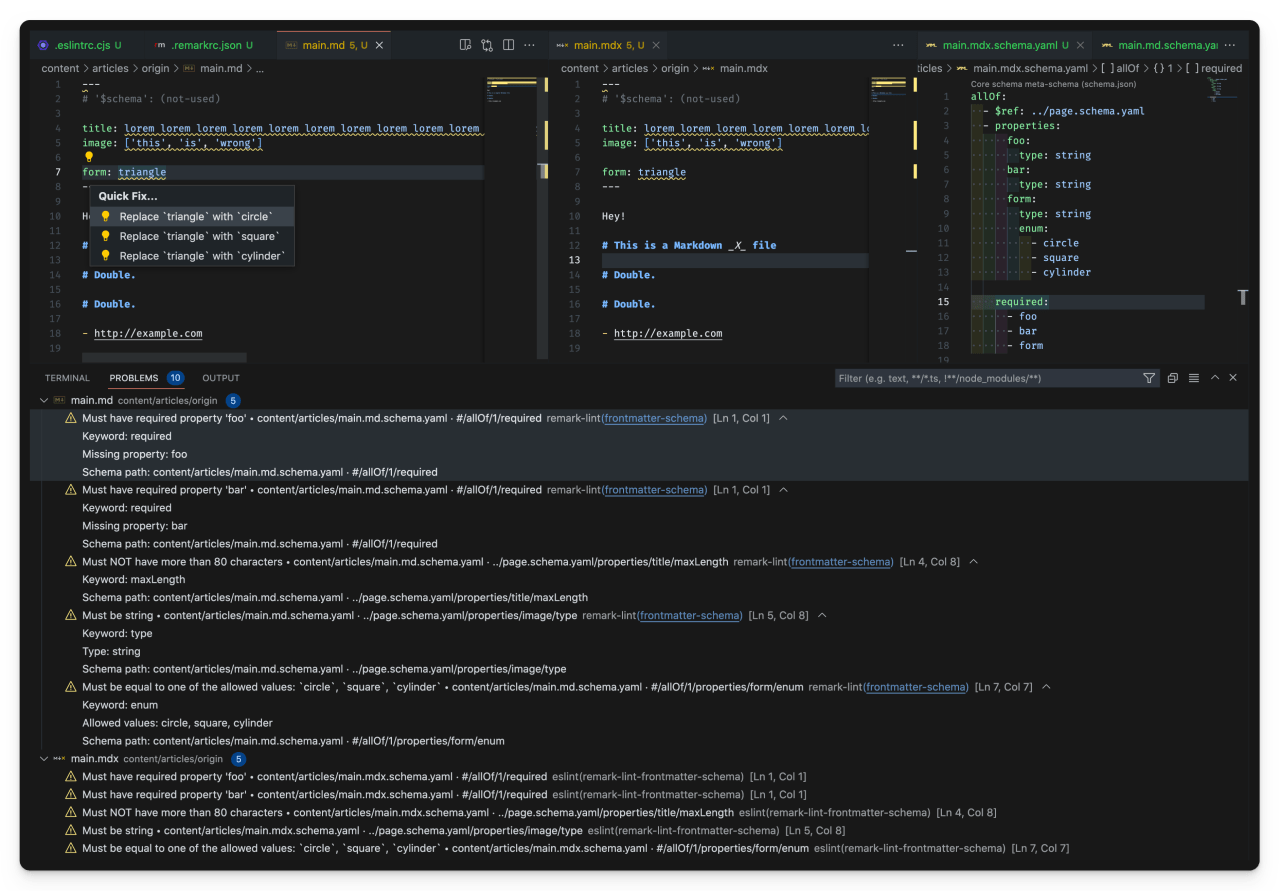@j_c/sea-cat-chain_astro-openapi--validation
v0.7.0
Published
Provides useful code generation for where you need to pass serializabled data. Very useful for:
Downloads
15
Maintainers
Readme
Astro OpenAPI — JSON Schema helpers (runtime checks, types…)
Provides useful code generation for where you need to pass serializabled data.
Very useful for:
- User input (Form, API request…)
- Markdown Frontmatter data
- Environment sourced variables (.env, Docker, JS configs…)
Features
- Runtime validation
- Precise error reporting
- Static types
- TS Documentation (auto-completion goodness).
- Replace missing / wrong content with fake / default / example.
Installation
pnpm astro add @astro-content/validator—OR—
pnpm i @astro-content/validator, then add to your astro.config.mjs:
import contentValidator from '@astro-content/validator';
export default defineConfig({
// ...
integrations: [
//...
contentValidator({ outDir: 'src/checkers' }),
],
});—OR—
Shallow clone demo project:
pnpx degit JulianCataldo/astro-content/packages/validator/demo ./ac-validator-demoIntegration
It will scan all src/**/*.schema.yaml in the Astro project and generate associated runtime validator and static types.
Settings:
outDir: Central destination for the generated checkers. Default: None
Examples:src/checkers,.astro-content/checkers,.astro/checkers…
If you leave it blank, generated files will be colocated with their input schema, regardless of their containing directory (a bit like a TypeScript declaration file).
E.g. ./src/schemas/post.schema.yaml → ./src/schemas/post.checker.ts
Usage
Gist:
import { checkArticle } from '/src/checkers/article.checker';
const frontmatter = { title: 'Hello world' };
const { result: entry, errors } = await checkArticle(frontmatter);
console.log({ title: entry.title, errors });
if (errors) {
// We don't want to pursue…
}
// Or maybe we want to!
// E.g. You've set the `default` or `examples` fields as fallbacks,
// or you'll get valid, though fake data.See also .remarkrc.yaml, wrong_entry-foo.md, blog-post.schema.yaml.
In Astro templates:
---
import { Code } from 'astro/components';
import { checkBlogPost } from '../checkers/blog-post.checker';
// Pre-validate all data upfront. This is not always wanted.
const blogPosts = await Astro.glob('/content/blog-posts/*.md').then((posts) =>
Promise.all(posts.map((post) => checkBlogPost(post.frontmatter))),
);
console.log(blogPosts);
---
<Code code={JSON.stringify(blogPosts, null, 2)} lang={'json'} />[
{
"result": {
"title": "This is a cool title.",
"description": "My description is long enough to make the schema happy.\nMore text. More text. More text. More text. More text.\n"
},
"schema": {
// ...
}
},
{
"result": {
"title": "My untitled blog post",
"tags": ["Music"],
"description": "No description found."
},
"errors": [
{
"instancePath": "/tags/0",
"schemaPath": "#/allOf/0/properties/tags/items/type",
"keyword": "type",
"params": {
"type": "string"
},
"message": "must be string"
},
{
"instancePath": "/tags/0",
"schemaPath": "#/allOf/0/properties/tags/items/enum",
"keyword": "enum",
"params": {
"allowedValues": [
"Music",
"Video",
"Development",
"Cooking",
"Gardening",
"Sport"
]
},
"message": "must be equal to one of the allowed values"
},
{
"instancePath": "",
"schemaPath": "#/allOf/1/required",
"keyword": "required",
"params": {
"missingProperty": "description"
},
"message": "must have required property 'description'"
},
{
"instancePath": "/title",
"schemaPath": "#/allOf/1/properties/title/type",
"keyword": "type",
"params": {
"type": "string"
},
"message": "must be string"
}
],
"original": {
"title": 123456,
"tags": [123456]
},
"schema": {
// ...
}
}
]See also the demo project to play with.
Alternative methods for generating checkers
This library is thought primarly as an Astro project integration but in fact, you could use it with any JS / TS project of yours, and use the helpers in the browser, too.
Moreover, you might want to customize checker generation inside your workflow.
You can access these helpers with an API and the CLI too.
API
import { generateChecker, generateAllCheckers } from './schema-to-validator';
const outDir = 'src/checkers';
await generateAllCheckers(outDir);
const schemaPath = 'src/schemas/post.schema.yaml';
await generateChecker(schemaPath, outDir);Recommendations
For the best experience, use these helpers in combination with remark-lint-frontmatter-schema.

Why JSON Schema (w. AJV)?
- Schemas are standards, declarative and re-usable.
- Top-tier performance: https://moltar.github.io/typescript-runtime-type-benchmarks.
- Biggest eco-system out there: think data fakers, types + TSDoc generator, form generators, OpenAPI….
But really, the two main reasons are that:
- AFAIK, it's the only way to get your hard worked-on TSDoc (from
descriptionfield). Which means nice and insightful auto-completion. - It allows this lib. to integrate perfectly with remark-lint-frontmatter-schema. This way, you get an end-to-end schema + types validation experience, from sources to client browser.
Ideas
- Refine the way on how fallback data is injected, relating to error handling and user preferences.

